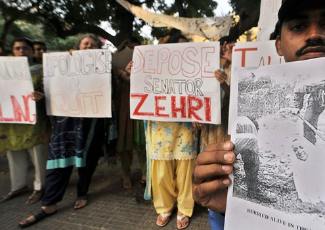Adil Najam and Owais Mughal
 Let us be as clear and unambiguous as we can. Those who think they can “restore” their honor by murdering others have no honor to begin with. There is no honor in murder. Ghairat cannot be gained or regained by butchering the weak. Indeed, murder is beghairati personified.
Let us be as clear and unambiguous as we can. Those who think they can “restore” their honor by murdering others have no honor to begin with. There is no honor in murder. Ghairat cannot be gained or regained by butchering the weak. Indeed, murder is beghairati personified.

 And let us never – never – let anyone confuse criminality with culture.
And let us never – never – let anyone confuse criminality with culture.
Yet, two members of the Pakistan Senate insist on doing exactly that. In defending (or seeming to defend) the most barbaric of so-called “honor killings” (in this case the burying alive of three young girls) Senators Israrullah Zehri and Jan Mohammad Jamali have not only shamed the Senate and all of Pakistan, they are in fact abusing and shaming the culture and traditions of all Baloch. They are conflating criminality with culture.
No, Senators, murder and criminality is NOT a part of “tribal tradition.” Clearly murder and criminality is not part of any religious tradition. It is certainly no part of Islam. There have been criminals and murders in all cultures and in all religions in all times. But criminality and murder is not part of any culture, any tradition, any religion. Even if some murderous actions have gone unpunished in the past, they do not define tradition, they define criminality. Those who confuse the criminal behavior of the murderous few with the essence of any culture (their own or someone else’s), abuse that culture and tradition itself. Not every tradition needs to be defended, and many need to be abandoned.
Let us never let anyone defend criminality and murder in the name of tradition and culture. Indeed, instead of defending criminality and murder in the name of culture and tradition, we should be defending culture and tradition from criminality and murder committed in its name.
For those few who may not know what we are talking about, here are the essentials from a news report in Dawn:
Balochistan Senator Sardar Israrullah Zehri stunned the upper house on Friday when he defended the recent incident of burying alive three teenage girls and two women in his province, saying it was part of ‘our tribal custom.’ Senator Bibi Yasmin Shah of the PML-Q raised the issue citing a newspaper report that the girls, three of them aged between 16 and 18 years, had been buried alive a month ago for wishing to marry of their own will.
The barbaric incident took place in a remote village of Jafarabad district and a PPP minister and some other influential people were reported to have been involved. The report accused the provincial government of trying to hush up the issue. Ms Shah said that the hapless girls and the women were first shot in the name of honour and then buried while they were alive. She also said that no criminal had been arrested so far.
Acting Chairman of Senate Jan Mohammad Jamali, who was presiding over the session, said: “Yasmin Shah should go to our society and see for herself what the situation is like there and then come back to raise such questions in the house.” Maulana Ghafoor Haideri of the JUI-F said there was no tradition of burying women alive in Baloch society because it was against Islam’s teachings. Jamal Leghari of PML-Q emphatically stated that there was no custom of burying people alive, adding that the Baloch people did not believe in it.
Senator Jan Jamali commented: “This is a provincial matter and it is being investigated at the provincial level and let us wait for the report of the investigation.” Leader of the Opposition Kamil Ali Agha accused the Balochistan government of ignoring the incident and said no jirga could order the burying of women alive and no law allowed anyone to commit such a crime and go unpunished. He urged the government to punish the people involved in it. Leader of the House Mian Raza Rabbani said: “We condemn the heinous act and assure the house that a complete report on the incident would be submitted on Monday.”
One can be shocked and angry and aghast at what one has been hearing. But one cannot remain quiet. To merely speak out may not help in itself, but to remain silent is to condone that which is horrible and inhuman with our silence. Even if speaking out does nothing except provide us with catharsis, silence emboldens the criminals and murderers who commit their heinous barbarism in the name of culture; and in doing so kill not only the innocent and the weak but the very culture and traditions that they speak of.
So, speak we must. But as we speak, let us also remain focused on what it is that shocks us and makes us angry and aghast. Yes, it is the words of these Senators – people who should know better – that cannot be reconciled. But, even more than that it is the act of barbarism that triggered the controversy in the first place. One does not want these two Senators to get away with what they have said, but even more than that those who have committed the henious act of burying three young girls alive must not get away with it.
One fears that the outrage has been not only triggered by but is focused on these two Senators and only on their words. Yes, indeed, what the Senators have tried to defend is indefensible and their words must be condemned in the strongest. But, and for exactly that reason, let us never forget that this story is not only about what the Senators have said, it is about the vile an venomous act of murder and criminality that triggered those words in the first place. Ultimately, even more than being about the words of two Senators this has to be about the actions of the murderers who killed and the lives of the women who are no longer alive because of those actions. It is important, but not enough, to have the Senators take their words back. It is far far more important to make sure that what happened to these three young girls must never happen to anyone, anywhere, ever again.
It was jahalat that killed them. But let neither the words of these two Senators nor the silence of the rest of us condone that jahalat.



















































To have our rulers submit to such horrendous crimes just goes to show that we neeed a change of face. Are we just voting the same people in? And has anyone thought about the fact that the villagers might have witnessed this crime but they could be helpless to stop it even if they disagreed with it?
I am also heartened by the way the people as well as government has reacted to this horrible event. I am glad that the government has taken action. I think the media has also played a very positive role. Let us all make sure that this does not die and justice is actually done and an example made so that people do not think they can keep getting away with things like this.
I think all the criticism is correct, but let us also acknowledge that as the updates above show, the government has done something here and done the right thing. Let us be clear that Pakistan government has acted against this and acted very strongly. As the headline says, this is criminal behavior of individuals and not the representation of a culture.
Zareen,
The purpose of my comment was to make a distinction between a family feud and a decree rendered by a jirga which holds the same powers as criminal and civil courts in a tribal society. The same ignorance may be the root cause behind both crimes but you must agree that the acts are inherently different since one is systematic and is used to gain and expand the power of a select few over poor and weak masses of the tribe.
I am in no way condoning the barbaric act regardless of who commits the crime or how the crime is committed. I am however questioning the argument that it is not a cultural norm. If a village witnesses the crime and accepts the outcome as a valid decision then by definition it is culturally acceptable to them.
Unfortunately, we may never be able to eradicate the ignorance behind this crime and isolated events will take place from time to time but we sure can strike the system that encourage this behavior.
There is no honor and tradition in killing. The tradition of Baloch tribes in the Karo Kari Context is completely different and had a lot of checks and balances which prevented this kind of barbaric activity. The Baloch senators are also ignorant of their own traditions and customs.